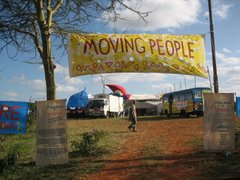There are many barriers to sustainable development, including
- Just defining what sustainable development is,
- Trying to making connections between sustainability issues that exist at different scales (from personal to community to global),
- Trying to make connections between sustainability issues that exist in different industries and activities (total life cycle costing issues), and
- Deciding how to properly balance environmental, social and ecological issues.
Most of these issues are mentioned in literature on sustainable development (including my study area of sustainable tourism) in some way or another.
One major challenge, however, that seems to never come up (please correct me if I am wrong) is the limitation of the human perception of time. "Be here now" is, unfortunately, how most of us behave too much of the time. It is extremely difficult to keep a long term time-horizon in mind in our day-to-day behavior and in our short-term, and even long-term, decision making.
For example, when we study major issues related to the environmental or social changes that the communities and the world in general have experienced, no matter what the methodology that we use, we are always limited to looking at one or more single slices of time. We take snapshots of the climate, of a glacier, of an ethnic group, of a city, and of an experience. We then assume that these snapshots from the past have some continuity and can, therefore, inform us of the current and future situation.
There are many problem with this approach.
First, the same problem can (and will) change over time. Problems do not exist in isolation. They are part of a larger ecosystem of influences, that are themselves influenced by external, and usually unpredictable, forces. All of these shape and influence the problem we are studying, morphing the it to something that could be very different from the time that the original data was collected.
Second, change is rarely linear. While we can hope that a linear regression formula of past data points will project in the same way into the future, we can never really know this. Unknowable catastrophic event are relatively common in the natural, social and business sciences (as any amateur economist would to attest to these days, if they were honest).
And third, human perception is inherently time horizon limited. We can probably make a pretty good prediction of the impacts of most of our actions over a very short time period -- say one day to one month or a little more. We can try to plan out activities for a year, but beyond that many people do not even think about it. (For some, even a year is such a challenge that they do not attempt it.) The reason for our lack of confidence in our planning time horizons is because we know that things change over time, and they usually change in a non-linear (i.e., non-predictable) manner.
The result of three time barriers is that we are better at seeing and acting upon short-term problems, and we are very bad at comprehending long term challenges, with the result being that we almost never take action on long term problems, even when most people agree that doom is impending. The largely unpredictable future freezes us in our tracks, and out of fear we cling to a belief that the long-term will be the same as today.
Unfortunately, issues of sustainability are almost always long-term, but the most common sustainability efforts tend to be short-term. Examples include making a decision whether or not to have your hotel towel washed or to reuse it, and trying to decide whether or not to install a very expensive home solar electrical system, even though you will earn your money back in the long run of ten years or so. We have made great progress in developing green certification programs that address immediate, short-term sustainability issues in different economic sectors (such as for hotels and travel providers). But we are at a loss as to how to deal proactively with global warming at a societal level.
We can think of sustainability issues at different time scale horizons. For example:
Short-Term / Immediate Emergency Issues
- Environmental Sustainability : More Pandemic Diseases
- Economic Sustainability : Job Losses; Windfall Profits
- Social Sustainability : Lack of Social Safety Nets
Near-Term Sustainability Impending Issues
- Environmental Sustainability : Loss of Coral Reefs
- Economic Sustainability : Shift in Job Locations & Types
- Social Sustainability : Increase in Global Internet Access
Long-Term Sustainability Visionary Issues
- Environmental Sustainability : Flooding of Coastal Cities
- Economic Sustainability : Need for New Types and Areas of Education
- Social Sustainability : Need for New Types and Forms of Governance
Long-term issues can be addressed at less cost and in a more gradual and less shocking manner if they are address early on. Over time, however, long-term issues will gradually become near-term and then short-term emergencies. Short-term and immediate issues are the most expensive and can require dramatic and sudden changes in policies, practices and behaviors.
Unfortunately, long-term solutions are also (1) the most difficult to project, because, as stated above, the problem will change over time, and (2) the most difficult to address because the limited time horizon of human perception makes political action almost impossible. But that does not mean that we should not try to think in terms of long-term sustainability in our personal behavior, our community actions, and our global outlook.
Alan A. Lew, Northern Arizona University. Originally posted on my Tourism Place blog.
